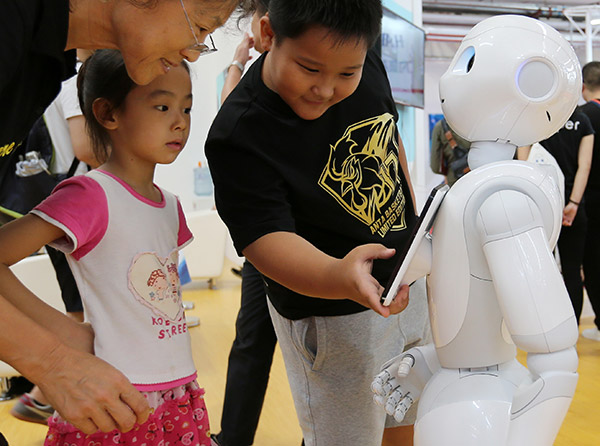Talent is crucial in taking the sector forward
China Daily | Updated: 2017-09-13 07:29
 |
| Young visitors interact with a robot at the 2017 World Robot Conference in Beijing themed "Win-Win Collaborative Innovation Toward the Building of an Intelligent Society". [Photo/China Daily by Wang Zhuangfei] |
China is beefing up efforts to attract highly-skilled professionals to work in AI as companies across the world scramble to get an edge in this cutting-edge field.
A report released by Hays showed that Chinese mainland enterprises have stepped up plans to hire staff involved in the artificial intelligence industry from the United States and Europe.
Many firms were offering the right candidates lucrative packages, including a 50 percent salary rise to relocate to China, the global recruitment agency stated.
"We are seeing significant government and private investment in AI across natural language processing, computer vision, speech recognition and data science," said Simon Lance, managing director for Hays Greater China.
Earlier this year, the government launched plans to invest heavily in research programs.
The aim is to turn the country's AI sector into an industry worth more than 150 billion yuan ($22.15 billion) by 2020, 400 billion yuan by 2025, and 1 trillion yuan by 2030.
"As a result, employers in the artificial intelligence space are becoming particularly competitive in their efforts to attract top people," Lance added.
But China faces key challenges and a skill gap compared with the US.
A major problem is that the country lags behind the world's biggest economy when it comes to employment numbers.
"China's AI talent (pool) is only half that of the United States, which may (hinder) future development of (the) AI industry (here)," a report from the Tencent Research Institute stated.
The survey, conducted by a division of internet giant Tencent Holdings Ltd, showed China had 592 artificial intelligence companies with nearly 40,000 employees by June, 2017.
In comparison, the US had 1,078 AI businesses with more than 78,000 employees.
The US is also ahead in four key employment areas, including processor and chips, and machine learning applications, as well as natural language processing and smart drones.
More than 20,000 people work in the natural language sector in the US compared to China's 6,600, the Tencent report highlighted.
Studies also found that Chinese AI staff are concentrated in sectors such as automated vehicles and smart medical treatment.
In the US, the focus is on wider sectors, including the chip industry, big data and storage, as well as technical areas such as image identification and robotics.
Research in automated vehicles was also pioneered there.
"One of the reasons that China lags behind the US in AI is because it started much later", the Tencent report stated.
Among the world's top 20 universities for artificial intelligence research, 16 are in the US, including the Massachusetts Institute of Technology and Carnegie Mellon University, according to the American National Science and Technology Council.
Not one Chinese university made the list.
"Up until now, China has not established a system to cultivate talent in AI," said Yu Youcheng, deputy secretary-general of Chinese Association for Artificial Intelligence.
"For example, artificial intelligence science and technology have not been set up as a first-level discipline," Yu added. "This may lead to the loss of core AI talent."
But the problem can be fixed by putting the right pieces of the jigsaw together.
"We should work to develop an ecological chain in the AI field," Yu said. "This would combine AI talent cultivation, technology standards and products and applications.
"But (doing this we can) transform and upgrade the whole industry," Yu added.
Cheng Yu contributed to this story.
























